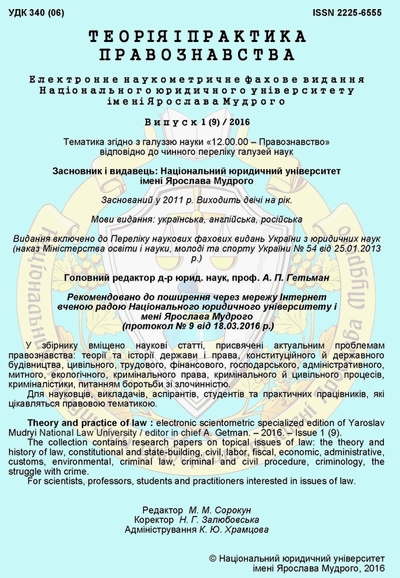Problems of legal regulation of usage of water sources in Ukraine
DOI:
https://doi.org/10.21564/2225-6555.2016.1.64242Keywords:
groundwater discharge, water source, surface water, water body, use of water sourcesAbstract
Problem Setting. The lack of a legal definition of «water source» and the ambiguity in the legal regulation of the use of well-water leads to neglect of water sources, uncontrolled loss, pollution and exhaustion of water resources. Therefore, the need to define the legal concept of «water source», studies the use and protection of these water bodies due to the lack of proper legal regulation of the rational use of water sources.
The actuality of the topic. In connection with the aggravation of environmental problems related to pollution of water resources inUkraine, the issue is the preservation of well-water quality, because the value of water sources is the possibility of their use for drinking water or balneology. In this regard, the relevance of theoretical studies of this issue is needed to improve the relevant legislation with the aim of forming an effective organizational and legal mechanism of rational usage and protection of water sources.
Analysis of recent researches and publications. Today in legal science the concept of «water source» has not been developed, and it is not paid enough attention to the usage and protection of water sources exactly, as separate water bodies. Despite the fact that the use and legal protection of natural resources as a whole and its individual components investigated in the science of environmental law, particularly in the scientific works of V. I. Andreytseva, A. P. Hetmana, V. M. Komarnitskogo, V. L. Muntyana, etc.
The purpose of the article. The purpose of this article is to clarify the content and the definition of such scientific and legislative concept as «water source», its place among other water bodies, research of features of legal relationships which arise up concerning the use of the well-water, and also analysis of problem questions in the legal regulation of general and special use of water sources. As a result of the conducted research the location of water sources among other water bodies was clarified, and it was proposed to include water sources to surface water with appropriate legal regulation of their use and protection, and it was defined the water source as a concentrated natural emergence of groundwater from various rock directly on the ground surface. It was found that water sources, the water quality which complies with environmental and sanitary standards, can be used as drinking water sources.
Conclusions. It was given the particular nature of the water source, the proposed consolidate regulations on the use of the water bodies on the rights of the general water use and the specification of the powers of the relevant bodies of state power and local self-government regarding protection and management of water sourcesReferences
Modelnyi vodnyi kodeks dlia derzhav-uchasnyts Spivdruzhnosti Nezalezhnykh Derzhav vid 16.11.2006. Ofitsiinyi veb-portal Verkhovnoi Rady Ukrainy (2006). Retrieved from: http://zakon4.rada.gov.ua/laws/show/997_g20 [in Ukrainian].
Dzhuhan, V.O. (2009). Pravove rehuliuvannia vykorystannia ta okhorony vod v Ukraini. Extended abstract of candidate’s thesis. Nats. un-t bioresursiv i pryrodokorystuvannia. Kyiv [in Ukrainian].
Serdiuk, O.V. (2013). Vodonosnyi horyzont yak pidzemnyi vodnyi ob’iekt. Teoriia i praktyka pravoznavstva, 2. Retrieved from: http://nauka.jur-academy.kharkov.ua/download/el_zbirnik/2.2013/29.pdf [in Ukrainian].
Vodnyj kodeks Rossijskoj Federacii ot 03.06.2006 № 74-FZ (red. ot 13.07.2015). (2015). Retrieved from: http://www.consultant.ru/document/cons_doc_law_60683/ [in Russian].
Vodnyj kodeks Respubliki Belarus' ot 30.04.2014 № 149-Z. Nacional'nyj pravovoj Internet-portal Respubliki Belarus'. Retrieved from: http://www.pravo.by/main.aspx?guid=12551&p0=Hk1400149&p1=1 [in Russian].
Vodnyj kodeks Respubliki Kazahstan ot 09.07.2003 № 481-II. Informacionnaja sistema «PARAGRAF». Retrieved from: http://online.zakon.kz/Document/? doc_id=1042116&doc_id2=1042116#pos=20;142.00001365488197&sub_id2=120000&sel_link=1002437929 [in Russian].
Vodna Ramkova Dyrektyva (Dyrektyva 2000/60/IeS Yevropeiskoho Parlamentu ta Rady vid 23.11.2000). Ofitsiinyi veb-portal Verkhovnoi Rady Ukrainy. (2000). Retrieved from: http://zakon1.rada.gov.ua/cgibin/laws/main.cgi?nreg=994_962 [in Ukrainian].
Vsevolozhskij, V.A. (2007). Osnovy gidrogeologii: uchebnik. 2nd. ed. Moskva: Izd-vo MGU [in Russian].
Klymenko, V.H. (2012). Zahalna hidrolohiia: navch. posib. Kharkiv: KhNU [in Ukrainian].
Serdiuk, O.V. (2014). Pravovi zasady vykorystannia pidzemnykh vod. Extended abstract of candidate’s thesis. Nats. yuryd. un-t im. Yaroslava Mudroho. Kharkiv [in Ukrainian].
Zakon Hruzii «Pro vodu» № 936 vid 16.10.1997. Ofitsiinyi elektronnyi resurs «Zakonodavchyi visnyk Hruzii» (1997). Retrieved from: https://matsne.gov.ge/ru/document/view/33448 [in Ukrainian].
Obiiukh, N.M. (2014). Osoblyvosti pravovoho rehuliuvannia vidnosyn u sferi vykorystannia dzherel pytnoho vodopostachannia v Ukraini. Biuleten Ministerstva yustytsii Ukrainy, 3, 135–141 [in Ukrainian].
Kolbasov, O.S. (1972). Teoreticheskie osnovy prava pol'zovanija vodami v SSSR. Moskva: Nauka, AN SSSR, In-t gosudarstva i prava [in Russian].
Erofeev B.V. (1981). Sovetskоe vodnoe i gornoe pravo: ucheb. posobie. Moskva: VJuZI [in Russian].
Anisimova, H.V. (2009). Pryrodno-pravovi zasady zahalnoho vodokorystuvannia. Problemy zakonnosti, 101. Kharkiv: Nats. yuryd. akad. Ukrainy im. Ya. Mudroho, 83–94 [in Ukrainian].
Downloads
Published
How to Cite
Issue
Section
License
Copyright (c) 2016 Теорія і практика правознавства

This work is licensed under a Creative Commons Attribution 4.0 International License.




